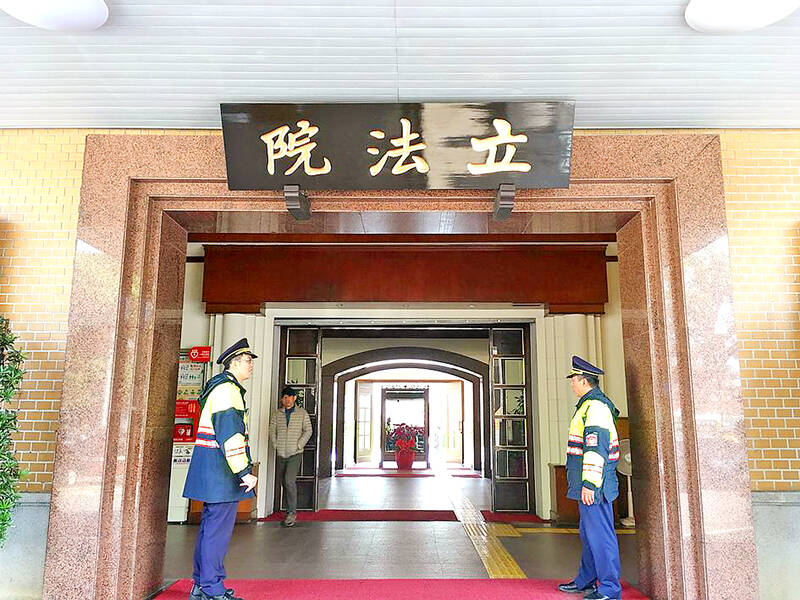The Taiwan Bar Association yesterday urged legislators not to circumvent established procedures to push through legislative reforms, while condemning a massive brawl that erupted between lawmakers on Friday.
Voting on the amendments to Article 15 of the Act Governing the Legislative Yuan’s Power (立法院職權行使法) — proposed by Chinese Nationalist Party (KMT) and Taiwan People’s Party legislators — was eventually done close to midnight by a show of hands without recording the names of the voters after scuffles and procedural stalling tactics by Democratic Progressive Party (DPP) lawmakers.
The association in a statement said that one party was “wrecking the operating principles of Taiwan’s constitutional democracy” to pursue its own interests.

Photo: Lin Liang-sheng, Taipei Times
The actions of opposition lawmakers to push through bills that would expand legislators’ powers and authorize funding for infrastructure in the east were taken without deliberation or review in legislative committees, in an effort to go straight to voting to pass a third reading, it said.
“The bills would have a great impact on the functioning of the government and the nation’s democratic constitutional order. They would also involve planning and authorization for significant portions of the budget, and have important ramifications for all people,” the association said.
It urged lawmakers to abide by democratic principles and follow legislative procedures, to ensure that bills receive legitimate scrutiny.
In addressing significant amendments and bills for major public infrastructure projects, the legislature must confer with all members for deliberation and receive feedback through established procedures before voting, it said.
The proposed bills would make “contempt of legislature” a punishable offense, while seeking more than NT$2 trillion (US$62.1 billion) for highway and high-speed rail projects.
The Legislative Yuan did not exercises its mandated functions in ensuring that the bills followed legislative procedures, and it had contravened those rules by voting using a show of hands, the association said.
KMT spokeswoman Yang Chih-yu said that a vote by a show of hands conforms to Article 35 of the Rules of Procedure of the Legislative Yuan (立法院議事規則).
The bills had gone through three public hearings and a presentation at a dedicated meeting, Yang said.
She said that DPP lawmakers had disrupted procedure by raising 40 motions to adjourn, when the bills underwent a clause-by-clause review at legislative committee meetings.
“We request that when speaking on these issues, the Taiwan Bar Association base their comments on facts,” she said, adding that association chairwoman Yu Mei-nu (尤美女), a lawyer and former DPP legislator, has political leanings on the issue.
“We ask Yu not to have double standards, and to remember the need to reform the Legislative Yuan,” she said.
Additional reporting by Lin Hsin-han

DAREDEVIL: Honnold said it had always been a dream of his to climb Taipei 101, while a Netflix producer said the skyscraper was ‘a real icon of this country’ US climber Alex Honnold yesterday took on Taiwan’s tallest building, becoming the first person to scale Taipei 101 without a rope, harness or safety net. Hundreds of spectators gathered at the base of the 101-story skyscraper to watch Honnold, 40, embark on his daredevil feat, which was also broadcast live on Netflix. Dressed in a red T-shirt and yellow custom-made climbing shoes, Honnold swiftly moved up the southeast face of the glass and steel building. At one point, he stepped onto a platform midway up to wave down at fans and onlookers who were taking photos. People watching from inside

A Vietnamese migrant worker yesterday won NT$12 million (US$379,627) on a Lunar New Year scratch card in Kaohsiung as part of Taiwan Lottery Co’s (台灣彩券) “NT$12 Million Grand Fortune” (1200萬大吉利) game. The man was the first top-prize winner of the new game launched on Jan. 6 to mark the Lunar New Year. Three Vietnamese migrant workers visited a Taiwan Lottery shop on Xinyue Street in Kaohsiung’s Gangshan District (崗山), a store representative said. The player bought multiple tickets and, after winning nothing, held the final lottery ticket in one hand and rubbed the store’s statue of the Maitreya Buddha’s belly with the other,

‘NATO-PLUS’: ‘Our strategic partners in the Indo-Pacific are facing increasing aggression by the Chinese Communist Party,’ US Representative Rob Wittman said The US House of Representatives on Monday released its version of the Consolidated Appropriations Act, which includes US$1.15 billion to support security cooperation with Taiwan. The omnibus act, covering US$1.2 trillion of spending, allocates US$1 billion for the Taiwan Security Cooperation Initiative, as well as US$150 million for the replacement of defense articles and reimbursement of defense services provided to Taiwan. The fund allocations were based on the US National Defense Authorization Act for fiscal 2026 that was passed by the US Congress last month and authorized up to US$1 billion to the US Defense Security Cooperation Agency in support of the

HIGH-TECH DEAL: Chipmakers that expand in the US would be able to import up to 2.5 times their new capacity with no extra tariffs during an approved construction period Taiwan aims to build a “democratic” high-tech supply chain with the US and form a strategic artificial intelligence (AI) partnership under the new tariffs deal it sealed with Washington last week, Taipei’s top negotiator in the talks said yesterday. US President Donald Trump has pushed Taiwan, a major producer of semiconductors which runs a large trade surplus with the US, to invest more in the US, specifically in chips that power AI. Under the terms of the long-negotiated deal, chipmakers such as Taiwan Semiconductor Manufacturing Co (TSMC, 台積電) that expand US production would incur a lower tariff on semiconductors or related manufacturing